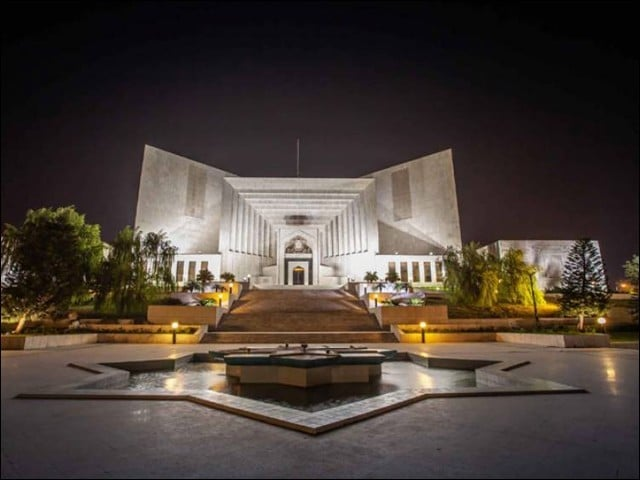
The Supreme Court on Tuesday observed that those judges who gave way to martial laws in the country should also be held accountable, with Chief Justice Qazi Faez Isa emphasising that it was necessary to go into the past and plan better for the future to become a nation.
The conduct of such judges came up during of the appeal against the conviction of former military ruler the late Gen Pervez Musharraf before a four-member bench led by Chief Justice Isa and comprising Justice Mansoor Ali Shah, Justice Aminuddin Khan, and Justice Athar Minallah.
Giving arguments via video link, Sindh High Court Bar Association (SHCBA) representative Rasheed A Rizvi brought the issue of judges' conduct to the court’s notice.
He pleaded the court that action should be taken against those who justified Musharraf's actions.
The chief justice said that “if we want to become a nation”, the future path must corrected by looking at the past.
“Reward and punishment will also go upward,” he said. “Lawyer should tell me why the pictures of the judges who broke the Constitution are hung here. Why should the judge point out?”
Justice Manullah remarked that the judges who showed the way to martial law should also be held accountable.
He added that this same court gave way to the Oct 12 action by Gen Musharraf. “Judges who declared Musharraf's martial law legal should also be tried,” he said.
“Why was the action taken only on Nov 3 action,” the judge asked, referring to the high treason charge against late Musharraf.
Read also: Late Musharraf’s death penalty still intact: SC
“If action will be taken only on the attack on the judges on Nov 3, then the question of fair trial will arise,” he continued.
“Was the attack on the judges more serious than dissolving the assemblies and suspending the Constitution?” he said, asking Advocate Razvi how far deep he wanted to go into the past.
“We must speak the truth.”
The chief justice pointed out that the media was also responsible and that they should also be held accountable.
“Tell me how many journalists were against martial law? We should learn from history and our children should also be taught.”
Justice Minullah said that there was history that whenever someone was strong, no one spoke against him but when the power of the strong declined, then came Asma Jilani's case decision, a reference to the Supreme Court judgment that Gen Yahya Khan's martial law in 1972 was illegal.
Musharraf, who dismissed the then Nawaz Sharif government in 1999, was tried for high treason by a special court for his unconstitutional step of imposing emergency in the country and suspending the constitution on Nov 3, 2007. He also dismissed several judges of the superior judiciary.
In 2019, the former military ruler, who was in Dubai at that time for treatment, was convicted of high treason and awarded the death penalty.
In the meantime, the Lahore High Court (LHC) had declared the special court that had tried Musharraf illegal.
Read: SC hears Musharraf’s appeals against death penalty
Appeals against both those decisions were pending before the apex court, when Musharraf passed away in Dubai in February this year.
During Tuesday’s hearing, the chief justice said that if the special court verdict was not mentioned in the LHC ruling, then Musharraf’s punishment remained intact.
Chief Justice Isa remarked that when the LHC gave its decision, the special court had pronounced its decision and the LHC did not say anything on the decision of the special court. Then what was the need for an academic exercise, he asked.
Justice Minallah remarked that late Musharraf also believed that even after the LHC decision, the decision of the special court remained intact, therefore, he had challenged the decision in the Supreme Court.
To a court query, Musharraf’s lawyer Salman Safdar said the LHC decision was not a decision.
The court asked the defence counsel if he had any contact with the heirs of Musharraf.
The layer replied he tried but he could not contact them.
Justice Mansoor remarked that Musharraf's pension and other benefits would also be affected if his sentence was upheld by the apex court.
Safdar sought time for contacting Musharraf's family and asked for a date after the holidays. The court then adjourned the hearing till Jan 10.
1719660634-1/BeFunky-collage-nicole-(1)1719660634-1-405x300.webp)

1732276540-0/kim-(10)1732276540-0-165x106.webp)

1732274008-0/Ariana-Grande-and-Kristin-Chenoweth-(1)1732274008-0-165x106.webp)

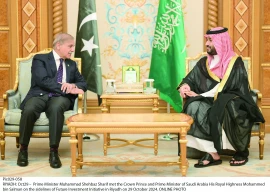
1724249382-0/Untitled-(640-x-480-px)1724249382-0-270x192.webp)

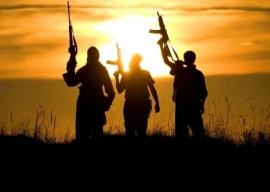
1732270499-0/Express-Tribune-(7)1732270499-0-270x192.webp)

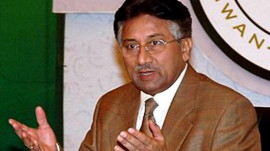
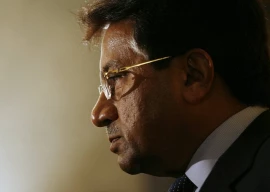
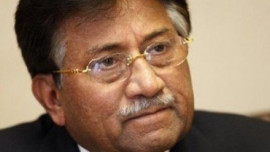






COMMENTS
Comments are moderated and generally will be posted if they are on-topic and not abusive.
For more information, please see our Comments FAQ